Sauntering down Taipei’s Zhenjiang Street (鎮江街), unsuspecting pedestrians are lured by a seductive scarlet carpet in front of what appears as a humble and rather mundane apartment — an abode that houses the only vegetarian restaurant in Taiwan on Michelin’s Bib Gourmand list: Serenity.
Aside from the restaurant’s pronounced store sign, its interior is almost entirely pigmentless, perhaps to highlight the vibrant colors of each exquisite dish. The anterior of the restaurant, enclosed in floor-to-ceiling glass panes, allows sunlight to be radiated onto every corner, creating a bright and invigorating atmosphere.
The interior decor consists of pale white walls, polished dark-brown wooden seats, and ordinary rectangular and round tables; though seemingly drab, such arrangement imbues a homey image that possibly leaves some reminiscing about their childhood.
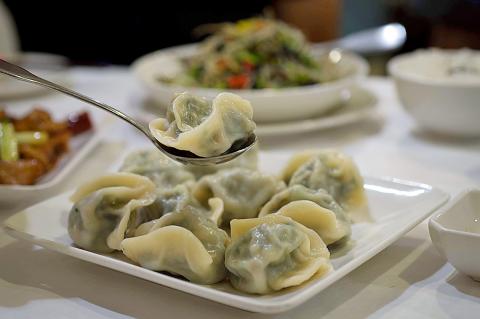
Photo: Vanessa Tsao
As our group of four waited to be seated, we couldn’t help but notice a spicy aroma coming from the kitchen. It turns out, this otherworldly scent was merely a byproduct of artwork jointly produced by two expert chefs, one specializing in Sichuan cuisine and the other in vegetarian cooking. With innovative mindsets, the two aim to intermix vegetarian ingredients with traditionally meat-based Sichuan flavors.
The waitress, who momentarily greeted us as we sat down, proudly introduced signature dishes on their 100-item long, full-vegetarian menu. Their menu, however extensive, was unfit for our indecisive minds; we ended up adhering to the waitress’s suggestions and ordered five dishes plus four bowls of rice.
The first to arrive was house-made vegetarian dumplings (NT$160). The dumplings are composed of a blend of finely shredded pickled cabbage, translucent vermicelli and diced mushrooms wrapped in a thin sheet of flour dough. The restaurant’s generous use of fresh, quality ingredients is evident in every bite; dipping in mild soy sauce adds an extra hint of savoriness. A Taiwanese staple, these boiled dumplings were the perfect preamble to the hearty dishes that follow.
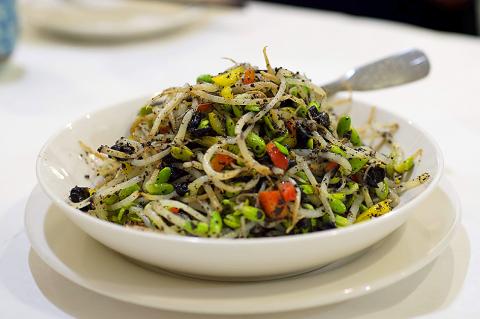
Photo: Vanessa Tsao
Then came the black bean sprouts in truffle sauce (NT$300), sauteed vermicelli with spicy vegetarian minced meat (NT$220) and vegetarian kungpao chicken (NT$220).
The bean sprouts feature assorted greens: crunchy young green sprouts, black beans, roughly diced yellow and red bell peppers tossed in an earthy truffle pate. To our surprise, the distinct flavors of constituent ingredients were not overshadowed by the truffle, which is usually indicative of the chef’s technique and precision.
The vermicelli, commonly known as “Ants climbing up a tree” (螞蟻上樹), is sauteed with bits of shiitake mushrooms, celery, chili peppers, soy-based minced pork in a piquant Sichuan spice blend and topped with aromatic coriander. The fiery vermicelli danced on our tongues. It sure was a tad spicy — though we had been warned. For those not used to firey Sichuan food, a reduction of spice is recommended.
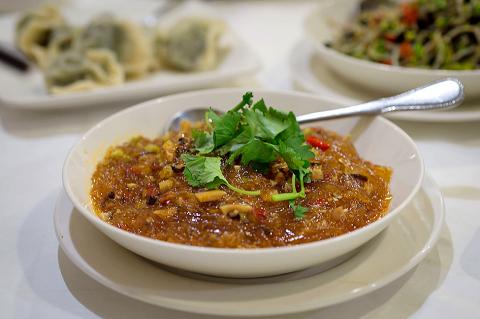
Photo: Vanessa Tsao
Of the three, the dish that really stood out for me was the soy and wheat infused kungpao “chicken.” Stir-fried with hollow Chinese chili, firm spring onions, peanuts and veiled by a tangy fragrant chili sauce, everything on that dish glistened. Juices in the chicken bursted with every bite. Needless to say, white rice harmonized with these Sichuan flavors.
The finale to such a scrumptious vegetarian meal was the impressive squid balls. The mixture of soy, wheat and what seems to have the texture of seitan or tofu is stuffed in cremini mushroom and deep fried to golden-brown perfection. They are seasoned with a dash of pepper salt and lie atop a bed of crispy basil leaves. These plant-based squid balls tasted so similar to actual squid balls that I forgot they were completely vegetarian.
We probably should have ordered their much-lauded steamed stinky tofu. I’ll definitely come back, though. The price was unbelievably fair (four overfull stomachs costed NT$1,408); no wonder this restaurant was featured on the Michelin guide’s Bib Gourmand section.
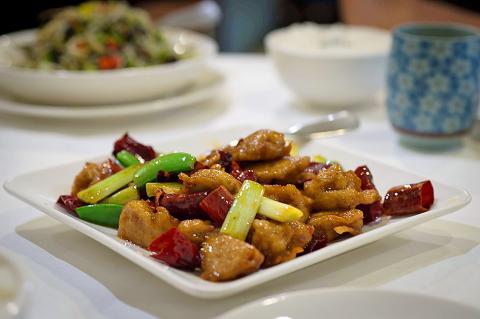
Photo: Vanessa Tsao
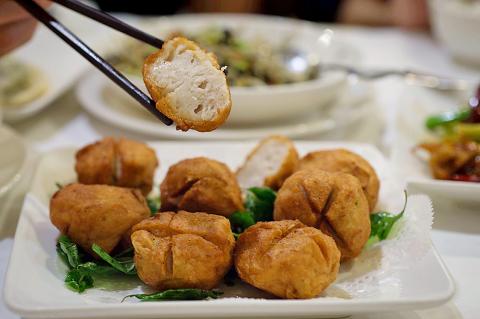
Photo: Vanessa Tsao

Growing up in a rural, religious community in western Canada, Kyle McCarthy loved hockey, but once he came out at 19, he quit, convinced being openly gay and an active player was untenable. So the 32-year-old says he is “very surprised” by the runaway success of Heated Rivalry, a Canadian-made series about the romance between two closeted gay players in a sport that has historically made gay men feel unwelcome. Ben Baby, the 43-year-old commissioner of the Toronto Gay Hockey Association (TGHA), calls the success of the show — which has catapulted its young lead actors to stardom -- “shocking,” and says

The 2018 nine-in-one local elections were a wild ride that no one saw coming. Entering that year, the Chinese Nationalist Party (KMT) was demoralized and in disarray — and fearing an existential crisis. By the end of the year, the party was riding high and swept most of the country in a landslide, including toppling the Democratic Progressive Party (DPP) in their Kaohsiung stronghold. Could something like that happen again on the DPP side in this year’s nine-in-one elections? The short answer is not exactly; the conditions were very specific. However, it does illustrate how swiftly every assumption early in an

Inside an ordinary-looking townhouse on a narrow road in central Kaohsiung, Tsai A-li (蔡阿李) raised her three children alone for 15 years. As far as the children knew, their father was away working in the US. They were kept in the dark for as long as possible by their mother, for the truth was perhaps too sad and unjust for their young minds to bear. The family home of White Terror victim Ko Chi-hua (柯旗化) is now open to the public. Admission is free and it is just a short walk from the Kaohsiung train station. Walk two blocks south along Jhongshan

Francis William White, an Englishman who late in the 1860s served as Commissioner of the Imperial Customs Service in Tainan, published the tale of a jaunt he took one winter in 1868: A visit to the interior of south Formosa (1870). White’s journey took him into the mountains, where he mused on the difficult terrain and the ease with which his little group could be ambushed in the crags and dense vegetation. At one point he stays at the house of a local near a stream on the border of indigenous territory: “Their matchlocks, which were kept in excellent order,